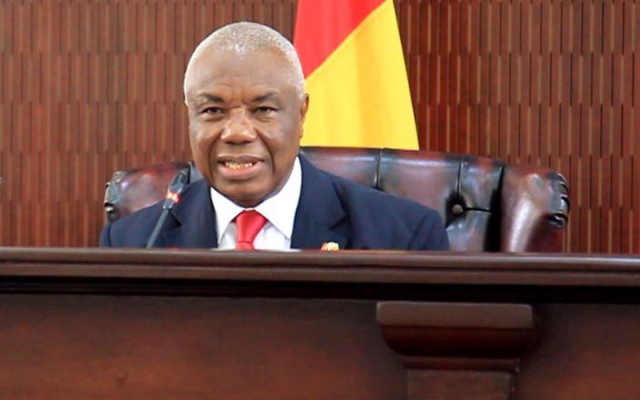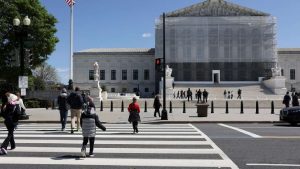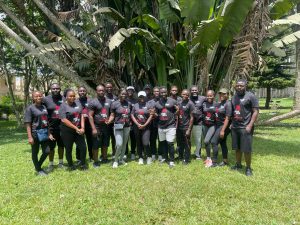One of the doyens of the Supreme Court in recent times, Justice Jones Victor Mawulorm Dotse, will drop his gavel tomorrow after 21 years on the bench, 15 years as a Justice of the highest court of the land.
Justice Dotse, the acting Chief Justice, who delivered his valedictory judgment yesterday, was described by judges, lawyers, family and friends as a distinguished jurist whose integrity, fairness, deep appreciation of the law and compassion had left a lasting impact on the law and the administration of justice.
After the valedictory judgment, the Supreme Court building was turned from its usual legal and formal character as an adjudication chamber to a theatre of dancing, thanksgiving, the show of love, appreciation and praises for the man who created the popular adage “create, loot and share” in the Woyome saga, an apparent reference to the corruption and decadence that had bedeviled the Ghanaian society.
Humanitarian work
The venerable Justice Dotse, whose legendary sense of humour and ability to make lawyers feel at ease in courtrooms, was overwhelmed with emotion; he shed tears when he was called upon to make a speech.
Amid intermittent tears, he thanked his family members, friends, lawyers, judges, his colleague Justices of the Supreme Court, and all those who had contributed to his success and supported him throughout his life and career.
Justice Dotse was particularly grateful to President John Agyekum Kufuor for appointing him to the High Court in 2002, promoting him to the Court of Appeal in 2003 and finally elevating him to the Supreme Court in 2008.
On what he intended to do on retirement, Justice Dotse said he would continue to be active and contribute to the promotion of justice by working with non-governmental organizations (NGOs) in the justice space.
Again, he said he would set up a Trust Fund in his mother’s name to support girl-child education in the mother’s hometown in the Volta Region and also build a nursery for the daycare he attended in Kpando.
Valedictory judgment
An attribute of Justice Dotse that reverberated throughout the courtroom was his fairness and quest to always use the law to promote justice, and that was manifested in the final valedictory judgment he delivered.
In the judgement, which was a certiorari application, Justice Dotse and four other members of the apex court, quashed the decision by the Tema High Court, which struck out a caveat by one Yaw Godwin Dorgbadzi and others challenging the letters of administration in the estate of a deceased pastor.
Delivering the judgment, Justice Dotse held that the Tema High Court, which was then presided over by Justice Emmanuel Ankamah, failed to give the applicant a hearing before striking out the caveat and, therefore, the court breached the rules of natural justice.
It was the considered view of the court that the evidence on record showed that the case was not listed for hearing, but strangely it was heard on the blind side of the applicants, with the presiding judge striking out the said caveat for want of prosecution and granting the letters of administration to the interested parties.
According to Justice Dotse, the irregular manner in which the case was determined pointed to the fact that the presiding judge “appeared to be bias against the applicants”.
Apart from quashing the decision by the Tema High Court, the Supreme Court also prohibited Justice Ankamah, who is now a Justice of the Court of Appeal, from hearing the case or having anything to do with it.
Again, the Supreme Court referred the matter to the Chief Justice (CJ) and urged the CJ to investigate the conduct of Justice Ankamah and the then Registrar of the Tema High Court, Sebastian Agbo, in relation to the case.
“This should also cover all officers who played any role in this shameful specie of conduct,” Justice Dotse said.
Champion of freedom
Leading the applauds for Justice Dotse, the Chief Justice designate, Justice Gertrude Araba Esaaba Sackey Torkornoo, described Justice Dotse as a “fierce contender for rights.”
She said Justice Dotse used his judgments to protect vulnerable groups such as women and orphans in decisions including “Gregory v Tandoh IV & Hanson” and “Mensah v Mensah”, a watershed decision in which Justice Dotse introduced equitable distribution of spousal properties between the husband and wife.
‘’For over four decades, you have served the law, 23 years of which have been to the nation and its citizens.
You have pursued the cause of justice and expanded freedom.
You have helped build this democracy we are enjoying now,” she said.
For the Attorney-General and Minister of Justice, Godfred Yeboah Dame, apart from his deep knowledge of the law and eagerness to do justice for all, Justice Dotse’s personality resonated with gentlemanliness, grace, respect for all, empathy for people and “understanding of the frailties of the human condition.”









